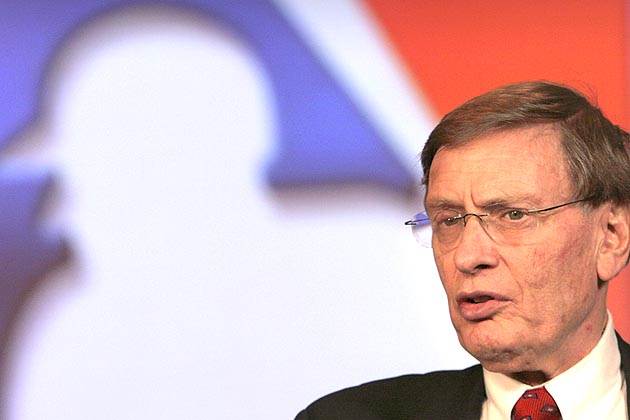
Black people, specifically those from the United States, don't play Major League Baseball at the peak numbers they did during the mid-1980s. In order to figure out why, commissioner Bud Selig created a 17-person diversity task force, with Detroit Tigers president Dave Dombrowski serving as chairman. The committee's first meeting happens today in Milwaukee. There will be blacks on the committee, too.
Tyler Kepner of the New York Times writes that 8.5 percent of the players on 25-man opening-day rosters were blacks from the U.S., down from a high of 19 percent in 1986, citing statistics published by Mark Armour of the Society of American Baseball Research. Numbers like those, along with the coming this week of "42," a movie biography of Jackie Robinson, leave Selig shrugging:
“I really think our history is so brilliant when it comes to African-Americans,” Selig said. “You think about the late 1940s, the 1950s — wow. And you look at that and you say to yourself, ‘Why did it not continue, and what could we do to make sure it does continue?’ ”
Reading between the lines of his quotes, Selig doesn't seem convinced that MLB necessarily has a problem, per se. But he wants to at least appear earnest in finding out for sure.
MLB has initiatives going out in the world, such as the Urban Youth Academy, which focus on helping young ballplayers of color get into major league systems. Aaron Hicks of the Minnesota Twins is the first UYA graduate to reach the majors. He might have tried to play another sport — in his case, golf — if baseball had not reached out.
And that seems to be the rub: Making sure kids are playing baseball, that youth leagues are fully funded, that college (and the scholarships that can accompany college) is an option. Some sociologists (amateur and otherwise) swear that black kids simply are playing other sports, or video games (something that is claimed about kids of all colors) and that has helped to dwindle the numbers. But is basketball, for example, really more popular now than in 1986? I seem to recall a lot of Michael Jordan fans out there.
Regardless, some of these factors would seem to be out of MLB's control — unless it wanted to hand out more cash. The owners already spend lots of money developing the talents of adults trying to play the game. Of course, many of those funds go to international players — and how many horror stories do we hear about how poorly some of them are treated anyway?
The players union might be sympathetic to a point in giving back to the kids, but asking wealthy ballplayers to invest in tomorrow isn't really appropriate. They have to want to do it — and many of them already do, probably to an extent we don't fully realize. What is the benefit for them in giving more? These guys aren't about to invest heavily in minor league players, much less subsidize hundreds of youth leagues or scholarship funds. Why? For an extra 5-10 percent black participation in the major league, maybe, in 15 years?
However, if baseball really wants to get 15 or 20 participation by blacks, lots of money probably is what it will take. And that's just to start.
aseball is back! Interact with @AnswerDave, @MikeOz, @Townie813 and @bigleaguestew on Twitter, along with the BLS Facebook page!
No comments:
Post a Comment